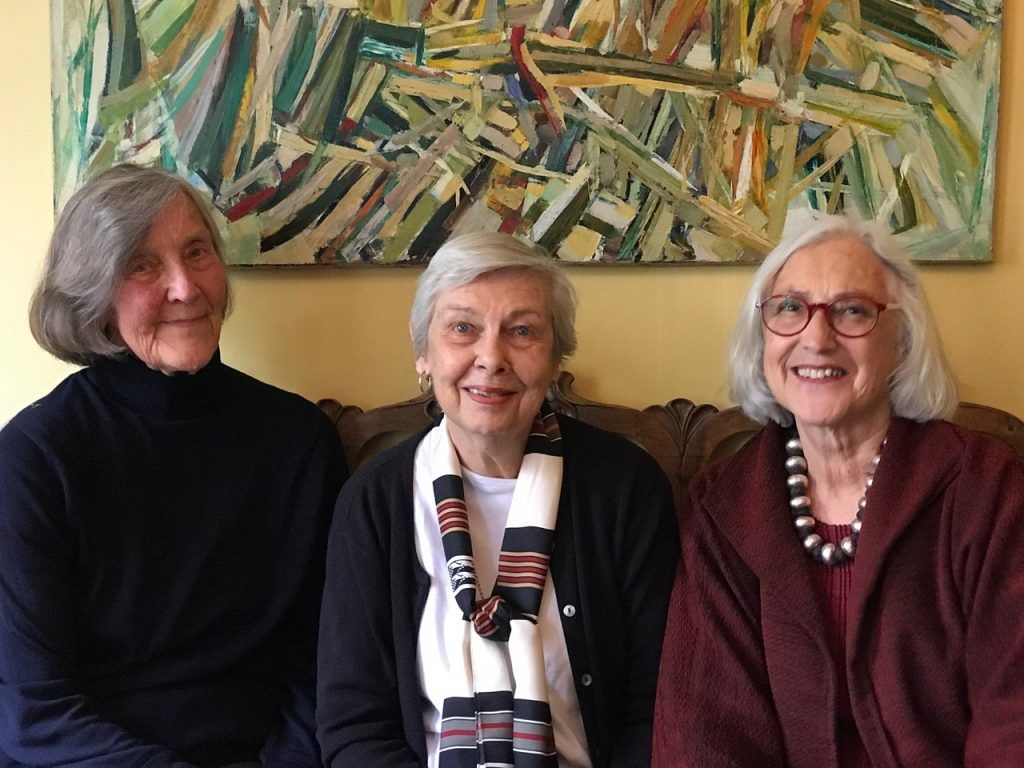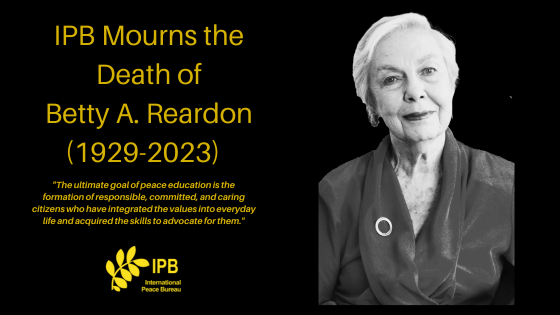The world has lost a major pillar of peace education, a great teacher and a feminist anti-war scholar and activist. We, who had the huge privilege of being her long-term friend, have lost a loving and caring friend, an inspirational and knowledgeable discussion partner and a wonderful person for joyful interaction. Betty Reardon was an exceptionally inspiring person, through her writing and teaching, as well as through her personality. She was courageous and consistent and had a huge capacity for friendship and care. She managed to bridge the personal and the political, the analytical and the practical.
When in deep sadness over the loss, it is not easy to find the right words. My first encounter with Betty was in 1984/85. I was participating on behalf of the Norwegian National Commission for UNESCO in a meeting in Oslo of an American – Russian – Norwegian education project. I felt very fortunate to meet these courageous and progressive Russian, American and Norwegian teachers, Valentina Mitina, Betty Reardon and Eva Nordland, cooperating intensely over several years in the middle of the Cold War. They impressed me profoundly. How we need such a bridge-building and cancel-culture-free project today!
My professional cooperation with Betty was primarily through UNESCO and the International Peace Bureau/IPB. In UNESCO the cooperation was centred on the major UNESCO program Towards a Culture of Peace, which, under the guidance of the inspiring Director General, Federico Mayor, became the top priority of the Organization. Betty was member of the Director General’s Advisory Group for the Women and the Culture of Peace program, that I was fortunate to chair, together with two outstanding members of the Executive Board of UNESCO, Ingrid Eide from Norway and Lourdes Quisumbing from the Philippines. Betty authored the UNESCO publication Education for a Culture of Peace in a Gender Perspective (Reardon, 2001) and edited the 1999 publication Towards a Women’s Agenda for a Culture of Peace with Dorota Gierycz from the UN Division for the Advancement of Women (DAW) and myself (Breines, Gierycz & Reardon).
Betty was not only party to the reflections in UNESCO on the culture of peace, but she was able to help translate the vision into practical educational tools, for different levels of the schools system and teacher training, as well as for adult education and study groups. And Betty had already in 1980 prepared the main working document for the important UNESCO World Congress on Disarmament Education. She was member of the Jury of the UNESCO Prize for Peace Education and in 2001 she got honourable mention of the UNESCO Peace Education prize. She authored the 3-volume UNESCO publication: Tolerance: The Threshold of Peace (1998), so needed to-day.
In May 2000 Betty lectured in Norway at the UNESCO conference at the University of Tromsø on Higher Education for Peace, Transforming a culture of war to a culture of peace.
The aim of the conference was to discuss conditions for peace and the role of institutions of higher education in promoting peace. The conference served as an opportunity to exchange research results and educational strategies that promote creative thinking about peace studies in higher education. I still remember vividly how proud I was of Betty speaking truth to male militaristic power in a big, packed auditorium. It was also interesting to observe how some people not knowing Betty, at the outset got somewhat confused, as they probably had expected a less radical and direct way of speaking from this beautiful lady, elegantly dressed with a silk scarf and none of the external progressive attributes. When I was in Pakistan as the UNESCO representative, Betty came to give a workshop on education for a culture of peace. It was so needed, and she was so well received. It gave echoes in the complex context of a post 11. September 2001 situation in Pakistan.
Many people, so also Betty, gave a lot of their time and energy in the planning of the 4th World Conference on Women in Beijing, September 1995. The overall theme was: Equality Development and Peace, in line with the three preceding UN conferences on women. We were happy from a peace activist point of view when the Beijing Declaration came to include the following: “The full participation of women in decision-making, conflict prevention and resolution and any other peace initiative are essential to the realization of lasting peace”.
UNESCO presented a Statement on Women’s Contribution to a Culture of Peace to the Beijing conference that got signed by women heads of states and governments and other leaders and peace activists. The statement was based on the report from an expert group meeting in Manila where Betty was the rapporteur. We felt gratified when the term culture of peace was used at the Beijing conference for the first time at the UN outside UNESCO. Strategic objective E.4.of the Beijing Platform for Action reads: “Promote women’s contribution to fostering a culture of peace”.
Betty had prominent roles in relation to several peace organizations, not least the International Peace Research Association (IPRA), the Women’s International League for Peace and Freedom (WILPF) and the International Peace Bureau (IPB). I have been fortunate to share many civil society activities and events with Betty. IPB was actively involved in the Global Campaign for Peace Education from the beginning, not least through the IPB President Cora Weiss and the Secretary General Colin Archer. In 2009 Betty received IPB’s Sean MacBride Peace Prize for her work, her teaching, her writing, her engagement and for establishing and running the International Institute for Peace Education. In 2016 Betty accepted an important role in IPB’s disarmament congress in Berlin: Disarm! For a Climate of Peace. Creating an Action Agenda. Betty undertook the difficult task of transforming ideas and suggestions presented to the congress into an operative peace methodology. See e.g. the publication based on the Berlin congress: Disarmament, Peace and Development. Vol. 27, Emerald Publishing, 2018. In addition, she organized with Tony Jenkins, Janet Gerson and Dale Snauwaert from the International Institute for Peace Education, a very well attended and appreciated workshop on peace education (Gerson, et. al., 2016). In 2013 Betty was nominated for the 2013 Nobel Peace Prize by the International Peace Bureau.
An archive of Betty’s published and unpublished works, the Betty A. Reardon Collection, has been established at the Center for Special Collections at The University of Toledo. It opened in 2009 and facilitates the access to her work.
Betty will continue to be with the global peace family in so many ways. May her thinking reach an ever broader audience! Thank you Betty!
In gratefulness!
Ingeborg Breines


